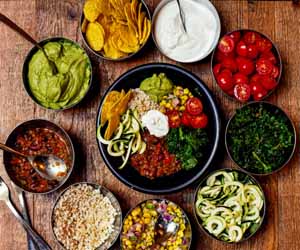


The Power Of Food Beyond The Body

Food is more than just sustenance; it has the remarkable ability to nourish not only our bodies but our souls as well. While we often focus on the physical aspects of nutrition, the concept of nourishing the soul through food is a profound one. It transcends the mere act of eating, delving into the realm of emotions, memories, and culture.
At its core, nourishing the soul through food is about more than filling our bellies; it's about filling our hearts and spirits. This concept is deeply rooted in the idea that food can offer comfort, healing, and a sense of connection. Here are some ways in which food nourishes our souls:
Comfort And Familiarity: There's a reason why certain foods are called "comfort food." These are the dishes that evoke a sense of nostalgia, reminding us of simpler times and the warmth of home. Whether it's a steaming bowl of chicken soup or a slice of homemade apple pie, these foods provide a feeling of comfort that nourishes the soul and eases stress.
Cultural Connection: Food is a powerful means of connecting with one's cultural roots. Traditional dishes and recipes passed down through generations carry the history and identity of a community. Preparing and savoring these foods is a way of staying connected to one's cultural heritage and, in turn, nourishing the soul.
Shared Experiences: Food has a unique ability to bring people together. Sharing a meal with loved ones, friends, or even strangers can foster a sense of community and belonging. The act of breaking bread together nourishes not only our bodies but also our souls, creating lasting bonds and cherished memories.
Mindful Eating: Being present in the moment while enjoying a meal is a form of meditation. Mindful eating allows us to appreciate the flavors, textures, and aromas of our food fully. This practice nourishes the soul by fostering gratitude and a deep connection with the present.
Healing And Restoration: Certain foods are believed to have healing properties, both physically and spiritually. Whether it's the soothing properties of herbal teas or the rejuvenating effects of a bowl of miso soup, these dishes are often seen as a way to restore balance and nourish the soul.
Creativity And Expression: For many, cooking is a form of creative expression. Crafting a delicious meal is an art, and the act of creating something beautiful and flavorful can be incredibly satisfying and spiritually fulfilling.
In a world that often moves at a relentless pace, taking the time to nourish our souls through food is a practice that can ground us, provide solace, and bring joy. It reminds us that food is not just fuel for our bodies but also a source of emotional nourishment and cultural richness.
To truly nourish the soul through food, it's essential to approach meals with intention and mindfulness. Whether you're savoring a cherished family recipe or trying a new dish from a different culture, take a moment to appreciate the experience fully. The act of nourishing your soul can be as simple as enjoying a cup of tea in solitude or as elaborate as hosting a feast with loved ones. The key is to let food do more than feed your body; let it feed your soul.
 2. Cross-Contamination
2. Cross-Contamination
Cross-contamination is a constant concern for individuals with celiac disease. Even a small amount of gluten can trigger symptoms or damage the small intestine. To mitigate this risk, create a dedicated gluten-free area in your kitchen, use separate utensils and cookware, and be cautious when dining out. Communication is key when eating at restaurants; be sure to inform the staff of your dietary restrictions to prevent cross-contamination.
3. Social And Dining Challenges
Social situations and dining out can pose challenges for those on a gluten-free diet. Friends and family may not fully understand the dietary restrictions, which can make social gatherings awkward.




A Path To Optimal Health
 The Role Of Vitamins
The Role Of Vitamins
Vitamins are involved in a multitude of physiological processes, including energy production, immune system function, and the maintenance of healthy skin, eyes, and bones. They act as cofactors in enzymatic reactions that are crucial for life. Each vitamin has specific roles and functions, and a deficiency in any of them can lead to various health problems.
Fat-Soluble vs. Water-Soluble Vitamins
Vitamins can be categorized into two groups: fat-soluble and water-soluble. Fat-soluble vitamins (A, D, E, and K) are stored in the body's fat tissues and liver. Excess amounts can accumulate, so it's essential to monitor their intake.
The Art Of Elevating The Dining Experience
 The Ingredients Of Culinary Excellence:
The Ingredients Of Culinary Excellence:
Culinary excellence encompasses a blend of key elements, all of which come together to create unforgettable dining experiences:
1. Creativity And Innovation: At the heart of culinary excellence is creativity. The most celebrated chefs and culinary artists are known for pushing the boundaries, experimenting with flavors, and devising new ways to present familiar ingredients. Innovation drives the evolution of culinary arts, leading to exciting and diverse dishes.
2. Exceptional Skill And Technique: Culinary excellence demands unwavering dedication to honing one's skills. Mastery of various cooking techniques, from sous-vide cooking to knife skills, is essential for chefs and culinary professionals. The artistry in mastering the craft is what sets culinary excellence apart.
3. Quality Ingredients: Superb culinary creations begin with the finest ingredients. Whether it's sourcing organic produce, selecting prime cuts of meat, or hand-picking herbs and spices, using top-quality ingredients is non-negotiable for achieving excellence in cuisine.
A Culinary Journey Through Your Backyard
 Flavorful Benefits:
Flavorful Benefits:
One of the most immediate and compelling benefits of homegrown flavors is the enhancement of taste. Here are a few reasons why homegrown produce tastes better:
Ripeness: Homegrown produce is harvested when it's perfectly ripe, ensuring that you experience the fullest, most vibrant flavors.
Nutrient Density: The time and care you invest in your homegrown produce can lead to higher nutrient content, contributing to more intense and wholesome flavors.
Variety: You have the freedom to choose a wide variety of fruits, vegetables, and herbs that may not be available at your local grocery store, diversifying your palate.
Unique Varietals: Experimenting with different heirloom or unusual plant varieties can lead to exceptional and distinctive flavors that are hard to find elsewhere.
A Sustainable Choice: Homegrown flavors align with the principles of sustainability and environmental responsibility. When you grow your own produce, you reduce your carbon footprint, as there are no transportation or packaging requirements. Additionally, you have the flexibility to practice organic and eco-friendly gardening, reducing the use of harmful chemicals and conserving resources.
Preserving Culinary Traditions Across Generations
 Timeless recipes have a universal appeal that transcends borders and cultures. While the specific dishes may differ from one region to another, the concept of time-honored cuisine is present everywhere. Whether it's the hearty, slow-cooked stews of Europe, the bold and flavorful curries of India, or the simple yet elegant dishes of Japan, every culture has its own set of timeless recipes that reflect its culinary heritage.
Timeless recipes have a universal appeal that transcends borders and cultures. While the specific dishes may differ from one region to another, the concept of time-honored cuisine is present everywhere. Whether it's the hearty, slow-cooked stews of Europe, the bold and flavorful curries of India, or the simple yet elegant dishes of Japan, every culture has its own set of timeless recipes that reflect its culinary heritage.
Beyond their delicious flavors and adaptability, timeless recipes play a vital role in preserving culinary traditions and sharing a piece of history. Preparing and sharing these dishes become acts of love and respect for those who came before us, as well as a means of educating the next generation about their cultural heritage.
Culinary Treasures That Stand The Test Of Time
 One of the defining characteristics of all-time favorites is their timeless appeal. These are the dishes that remain consistently beloved, regardless of the latest culinary trends. They resonate with our taste buds and our memories, serving as a source of comfort, nostalgia, and satisfaction. These are the recipes we turn to when we seek solace in the familiar.
One of the defining characteristics of all-time favorites is their timeless appeal. These are the dishes that remain consistently beloved, regardless of the latest culinary trends. They resonate with our taste buds and our memories, serving as a source of comfort, nostalgia, and satisfaction. These are the recipes we turn to when we seek solace in the familiar.
Beyond their irresistible flavors, all-time favorites are often imbued with cultural and familial significance. They are the dishes that have been passed down through generations, each version tweaked and perfected over time, resulting in recipes that are deeply rooted in tradition. All-time favorites provide a connection to our culinary heritage, preserving the techniques, ingredients, and flavors that have been treasured for centuries.
Striking The Right Balance In Modern Life
 Quality As A Cornerstone
Quality As A Cornerstone
On the other hand, quality is an essential aspect of life that affects our satisfaction and long-term well-being. Whether it's the quality of the food we eat, the products we use, or the relationships we foster, the intrinsic value often trumps the allure of convenience. Quality provides lasting enjoyment and a sense of fulfillment.
The Food Conundrum
One area where convenience vs. quality is palpable is in our food choices. Fast food and processed meals are convenient and quick, but they often lack the nutritional value and flavors of freshly prepared, high-quality ingredients.